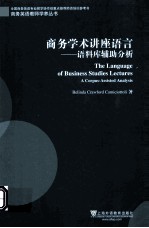
- 作 者:卡密乔托里(BelindaCrawfordCamiciottoli)著
- 出 版 社:上海:上海外语教育出版社
- 出版年份:2014
- ISBN:9787544637633
- 标注页数:236 页
- PDF页数:265 页
请阅读订购服务说明与试读!
订购服务说明
1、本站所有的书默认都是PDF格式,该格式图书只能阅读和打印,不能再次编辑。
2、除分上下册或者多册的情况下,一般PDF页数一定要大于标注页数才建议下单购买。【本资源265 ≥236页】
图书下载及付费说明
1、所有的电子图书为PDF格式,支持电脑、手机、平板等各类电子设备阅读;可以任意拷贝文件到不同的阅读设备里进行阅读。
2、电子图书在提交订单后一般半小时内处理完成,最晚48小时内处理完成。(非工作日购买会延迟)
3、所有的电子图书都是原书直接扫描方式制作而成。
CHAPTER 1 Introduction 1
1.1 Rationale for the study 1
1.2 The university lecture:pros and cons 2
1.3 Aims of the study 4
1.4 Target readership 6
1.5 Overview of the book 6
CHAPTER 2 Background to the study:The merger of discourses 9
2.1 Introduction 9
2.2 Spoken discourse 9
2.2.1 The linguistic/discursive approach 10
2.2.2 The interactional approach 13
2.3 Academic discourse 15
2.4 Disciplinary discourse:the field of economics 21
2.5 Professional discourse:the world of business 25
2.6 A conceptual framework for analyzing business studies lectures 28
CHAPTER 3 The business studies lecture corpus:Design,collection and analysis 31
3.1 Introduction 31
3.2 Corpus design 31
3.3 Collecting the data 34
3.4 Transcribing the data 36
3.5 Methodology:an integrated approach 39
3.5.1 Quantitative and qualitative analysis 39
3.5.2 Comparative analysis 41
3.5.3 Behavioural observation 42
3.5.4 Participant feedback 43
CHAPTER 4 Speaking to the audience 45
4.1 Introduction 45
4.2 Speech rate 46
4.3 Lecture style 49
4.3.1 Discourse dysfluencies 52
4.3.2 Reduced forms 54
4.4 Lexical informality 57
4.4.1 Vagueness 58
4.4.2 Idioms 62
4.5 Syntactic informality 65
4.5.1 Ellipsis 66
4.5.2 Non-restrictive which-clauses 68
4.6 Lexical density 73
4.7 Summary of findings 76
CHAPTER 5 Interacting with the learners 79
5.1 Introduction 79
5.2 Discourse structuring 79
5.2.1 Lecture macrostructure 80
5.2.2 Macromarkers 84
5.2.3 Micromarkers 89
5.3 Evaluation 94
5.3.1 Relevance markers 96
5.3.2 Afiect markers 100
5.4 Lecturer-audience interaction 104
5.4.1 Questions 105
5.4.2 Comprehension checks 108
5.4.3 Dialogic episodes 109
5.5 Audience responsiveness and feedback 113
5.6 Summary of findings 115
CHAPTER 6 Teaching the discipline and the profession 119
6.1 Introduction 119
6.2 Disciplinary/professional orientations:a descriptive profile 120
6.3 Real vs.hypothetical worlds 122
6.4 Argumentation 125
6.5 Specialized lexis 127
6.5.1 Global analysis 128
6.5.2 Keyword analysis 131
6.5.3 Connections to Business English 135
6.5.4 Compounds and buzzwords 138
6.6 Metaphors 142
6.6.1 Global analysis 144
6.6.2 Comparative analysis 147
6.7 Summary of findings 148
CHAPTER 7 Beyond speaking:Multimodal aspects 151
7.1 Introduction 151
7.2 The visual mode 153
7.2.1 The analytical framework 154
7.2.2 The analysis 155
7.2.2.1 Visual typologies in the BSLC 158
7.2.2.2 Comparative analysis 163
7.3 The nonverbal mode 165
7.3.1 Methodology in nonverbal studies 168
7.3.2 The analysis 169
7.3.2.1 Interpersonal episodes 170
7.3.2.2 Nonverbal behaviours of the 1ecturers 171
7.3.2.3 A microanalysis of one lecturer's nonverbal behav-iours 177
7.4 Summary of findings 181
CHAPTER 8 Final remarks 183
8.1 Introduction 183
8.2 Aims,findings,pedagogical implications and research prospects 183
8.3 Methodological insights 188
8.4 Business studies lectures and interdiscursivity revisited 189
References 193
Appendix A-Transcript samples from the twelve lectures of the BSLC 213
Appendix B-Specialized lexis in the BSLC ranked according to frequency 227
Name index 231
Subject index 235
